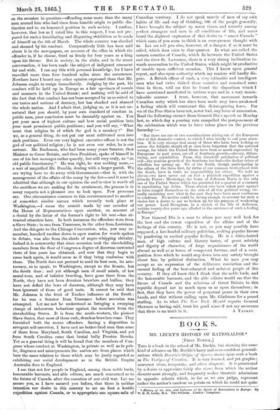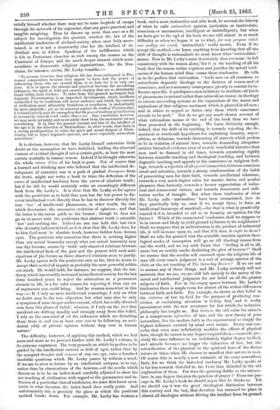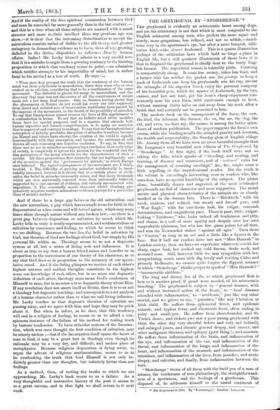BOOKS.
MR. LECKY'S HISTORY OF RATIONALISM.* [Fxrisr NoricE.] Tins is a book in the school of Mr. Buckle, but showing the same kind of advance on Mr. Buckle's hasty and over-confident generali- zations which Darwin's Origin of Species shows upon such a book as The Vestiges of Creation. It is very learned, and yet graphic ; moreover clear, temperate, and often eloquent. It is penetrated by a desire to appreciate fairly the views from which the author dissents most strongly, and frequently makes theoretic admissions to opposite schools which, as far as we can judge, represent rather the author's candour on points on which he could not quite
• History of the Rise and Influence of the Spirit of Rationalism in Europe. Hy W. 5.11. Leoky, MA. Two volumes. London : Longman. satisfy himself whether there may not be some loophole of escape through the network of his argument, than any grave practical and
tangible misgiving. Thus he throws up more than once as a fit subject for investigation the question whether the law of the intellectual tendencies of civilized society, when once fully ascer- tained, is or is not a trustworthy clue for the intellect of in- dividual men to follow. Speaking of the indifference which is felt to Protestant churches as such among the masses on the Continent of Europe, and the much deeper interest which semi- socialistic or democratic religious organizations, like the Al az- zinia,n, for instance, excite, Mr. Lecky remarks :—
"To assume, however, that religious life has been extirpated in Pro-. testant communities because they appear to have lost the power of influencing those who are around them, is to look for it in only one form. It is to ignore the intense and practical fervour, the moralizing influences, the spirit of bold and earnest inquiry that are so abundantly found within their borders. To infer from this general movement that dogmatic Protestantism is an imperfect development, which intellects unshackled by its traditions will never embrace and which the current of civilization must ultimately transform or overthrow, is undoubtedly far more plausible ; yet, as an argument against the truth of Protestantism, it is based entirely upon the assumption that the general tendency of civilization is necessarily towards truth rather than error. One conclusion, however, we may most certainly and most safely draw from the movement we are considering. It is, that the general current and bias of the intellect of the age is in the direction of Rationalism; in other words, that there is a strong predisposition to value the spirit and moral element of Chris- tianity, but to reject dogmatic systems, and more especially miraculous narratives."
It is obvious, however, that Mr. Lecky himself entertains little doubt on the assumption we have italicized, holding the observed current of civilized thought if not a certain guide, at least the most certain available to human reason. Indeed if he thought otherwise the whole raison d'être of his book is gone. Not of course that a learned and thinking man who believed that the intellectual de-
velopment of centuries was in a path of gradual divergence from the truth, might not write a book to trace the deflection of the curve of intellectual tendency from the curve of absolute truth ; but if he did he would certainly write an exceedingly different book from Mr. Lecky's. It is clear that Mr. Leaky so far agrees with the positivists as to hold that man has far less power to dis- cover intellectual truth directly than he has to discover directly the true 'law' of intellectual phenomena, in other words, the rule
which determines the successive evolution of opinions ; and that the latter is the surest guide to the former ; though he does not go on to assert with the positivists that abstract truth is scientific 'law' and nothing else. Indeed no one can hold this last view who devoutly believes in God, as it is clear that Mr. Lecky does, for to him God must be absolute truth, however hidden from human eyes. The positivist who conceives that there is nothing higher than our actual humanity except what our actual humanity may one day become, means by 'truth' only observed relations between the intellectual facts of the past and the present with such anti- cipations of pie future as those observed relations seem to justify. Mr. Lecky agrees with the positivists only so far, that he seems to accept their method of inquiry as probably the most powerful within
our reach, lie would hold, for instance, we suppose, that the ten- dency which has steadily increased in intellectual society for the last three hundred years to reject the miraculous as a permanent element in life, is a far safer reason for rejecting it than any set of arguments you could bring. And he reasons somewhat in this way :—' If I rely on mere intellectual reasonings, I rely on what no doubt may be the true objection, but what may also be only a symptom of some deeper under-current, which has really diverted men from this phase of belief ; whereas, if I rely on the fact that mankind are drifting steadily and strongly away from this belief, I rely on the sum-total of all the influences which are detaching them from it, and am at least sure not to be following an acci- dental eddy of private opinion without deep root in human nature.'
The difficulty, however, of applying this method, which we feel more and more as we proceed further with Mr. Lecky's volume, is its extreme vagueness. The very grounds on which he prefers to be guided by the intellectual current or drift of ages, rather than by the accepted thoughts and reasons of any one age, raise a hundred
insoluble questions which Mr. Lecky passes by without a word. If we are to steer in future by an intellectual compass, so to say, rather than by observations of the heavens,—if the needle which directs us is to be an index-hand carefully adjusted to show the net teaching of civilization with regard to the permanence and in- fluence of a particular class of tendencies, we must first know accu- rately in what direction the index-hand does really point. And unfortunately this is precisely the place at which the positivist method breaks down. For example, Mr. Lecky has written a book, and a most instructive and able book, to recount the history of what he calls rationalistic opinion (articulate or inarticulate, conscious or unconscious, intelligent or unintelligent), but when we have got to the end of his book we are still almost in as much difficulty as when we began it as to what, for any purpose which can modify our creed, 'rationalistic' really means. Even if we accept the method,—to learn anything from knowing that all the drift of thought is rationalistic we must know what ' rationalistic ' means. Now in Mr. Lecky's sense it certainly does not mean in full consistency with the reason alone,' for it is the teaching of all his book that the reason rather registers and justifies the actual tend- encies of the human mind than causes those tendencies. He tells us in the preface that rationalism "leads men on all occasions to subordinate dogmatic theology to the dictates of reason and of conscience, and as a necessary consequence greatly to restrict its in- fluence upon life. It predisposes men in history to attribute all kinds of phenomena to natural rather than miraculous causes ; in theology to esteem succeeding systems as the expressions of the wants and aspirations of that religious sentiment which is planted in all men ; and in ethics to regard as duties only those which conscience reveals to be such." Nor do we get any much clearer account of what rationalism means at the end of the book than we have thus presented at the beginning. We learn distinctly enough, indeed, that the drift of its teaching is towards rejecting the de- moniacal or witchcraft hypothesis for explaining insanity, super- stition, or delusions, towards distrusting all marvels which profess to be in violation of natural laws, towards demanding altogether stricter historical evidence even of merely wonderful histories than men used to demand in old times, towards separating rigidly between scientific teaching and theological teaching, and between dogmatic teaching and appeals to the conscience or religious feel- ings, towards a rejection of all special connection between conscious creed and salvation, towards a strong condemnation of the habit of persecuting men for their faith, towards intellectual tolerance, towards a very much higher value for secular duties and secular pleasures than formerly, towards a keener appreciation of indus- trial and commercial virtues, and towards democratic and utili- tarian modes of thought. But when these tendencies of what Mr. Lecky calls ' rationalism ' have been enumerated, how do they practically help us, even if we accept them, to form an intellectual horoscope of mankind, —for that is what is practically wanted if it is intended to aid us in forming an opinion for the future? Which of the enumerated tendencies shall we suppose to be in excess and likely to yield ground in future to its neighbours? Shall we suppose that as utilitarianism is the product of industrial life, it will increase upon us, and that if it does, it ought to do so ? Shall we take for granted that the scientific reaction against theo- logical modes of conception will go on till theology ceases from out the world, and we say with Faust that "feeling is all in all, name but an earthly smoke darkening the glow of heaven?" Shall we assume that the secular will encroach upon the religious life of man till every man's judgment is a sort of average opinion of the clubs or the net teaching of The Saturday Review ? If we are not to assume any of these things, and Mr. Leaky certainly will not maintain that we are, we are still left entirely to the mercy of the moral and intellectual judgment for our belief on all the greater subjects of faith. For in the empty spaces between Mr. Lecky's tendencies there is ample room for almost all the widest differences between faith and faith. For example, he shows us that belief in the violation of law by God for the purpose of producing con- viction or enchaining attention is fading fast, and is really inconsistent with the new reverence for law which the inductive philosophy has taught us. But between the old value for miracle as a conspicuous infraction of law, and the new theory of pure naturalism, lies the modern faith in the supernatural as simply the highest influence exerted by mind over nature. Every one con- cedes that even man in3efinitely modifies the effects of physical laws, though he cannot in any degree suspend them ;—concede pre- cisely the same influence in an indefinitely higher degree to God, and miracle becomes no longer the infraction of law, but the subordination of the physical to the spiritual laws of the divine nature at times when He chooses to manifest that nature to man. Of course this is merely a new rationale of the same marvellous facts, but we think the historical tendency Mr. Lecky speaks of is fax less towards disbelief in the facts than disbelief in the old explanation of them. For does the growing dislike to the miracu- lous in any degree threaten the practice of prayer ? From one pas- sage in Mr. Lecky's book we should argue that he thinks so. Yet we should say it was the great theological distinction between this century and the last, that devotion has resumed its place in almost all theologies without driving the intellect from its ground. And if the reality of the free spiritual communion between God and man be conceded far more generally than in the last century,— and this in a time when all these subjects are scanned with a much sincerer and more reilistic intellect than any previous age can show,—it is clear that the increasing disinclination to accept the miraculous consists rather of dislike to the old theory, and greater stringency in demanding evidence as to facts, than of any growing disbelief in the divine disposition to influence directly human affairs. Indeed Mr. Lecky himself admits in a very candid note that it is a mistake to argue from a growing tendency to the limiting proposition to which that tendency seems to point,—an admission which testifies strongly to his impartiality of mind, but is rather fatal to his method as a test of truth. He says :— "When men first grasped the truth that the tendency of the human mind was from polytheism to monotheism, there were some who at once rushed on to atheism, considering that to be a continuation of the same movement. The disbelief in ghosts led many to materialism, and the discovery that man was not the centre of all the contrivances of nature made not a few deny final causes. Just so, Science having shown that the phenomena of Nature do not result (as every one once supposed) from direct and isolated acts of intervention, multitudes have passed, by the impetus of the movement, to the denial of the possibility of miracles. To say that Omnipotence cannot reverse the laws of His appointment is a contradiction in terms. To say that an Infinite mind never modifies those laws for special purposes, and in a manner that exceeds both human capacities and human comprehension, is to make an assertion that is unproved and contrary to analogy. To say that themetaphysician's conception of Infinity precludes the notion of miracles is useless, because (as Manse' and others have shown) the creation of the world is equally irreconcileable with that conception, and because the existence of evil throws all such reasoning into hopeless confusion. To say, in fine, that there was no use in miracles accompanying a revelation in an early stage of society, is completely to ignore the passion for the wonderful and the dim perception of the moral wherein are the characteristics of such a society. All these propositions flow naturally, but not legitimately, out of the re-action against the government by miracle,' in which Europe once believed. The logical consequences of the movement are, I think, twofold. 1. The difficulty of proving miracles satisfactorily is incal- culably increased, because it is shown that in a certain phase of civili- zation the belief in miracles necessarily arises, and that many thousands which are now universally rejected were then universally believed, supported by a vast amount of evidence, and entirely unconnected with imposition. 2. The essentially moral character which theology pro- gressively acquires renders miraculous evidence (except for a particular class of minds) useless."
And if there be a large gap between the old iniraculism and the new naturalism, a gap which leaves ample room for faith in the Supernatural as a free cause and will behind nature, which may some times shine through nature without any broken law,—so there is a great gap between dogmatism or salvation by creed, which Mr. Leaky tells us truly is nearly superannuated, and sentimentalism or salvation by conscience and feeling, to which he seems to think we are drifting. Between the two lies the belief in salvation by God, not theories of God nor feelings about God, but simply by His personal life within us. Theology seems to us not a dogmatic system at all, but a series of living acts and influences. It is about as true to say that a human friend raises and benefits us in proportion to the correctness of our theory of his character, as to say that God does so in proportion to the accuracy of our specu- lative creed. And if the living glimpses we receive of each other's highest natures and noblest thoughts constitute in the highest sense our knowledge of each other, but in no sense our dogmatic definition of each other, theology must mean God's confession of Himself to man, but in no sense a true dogmatic theory about Him. If any revelation does not assert itself as divine, then it is to us not a theology but dogmatic teaching; and corresponds to a set analysis of a human character rather than to what we call living influence. Mr. Leeky teaches us that dogmatic theories of salvation are passing away, and we agree with him, and hope they may be quick about it. But when he infers, as he does, that this tendency will end in a religion of feeling, he seems to us to afford a con- spicuous instance of the failure of his method for testing truth by historic tendencies. To have orthodox notions of the Incarna- tion, which was once thought the first condition of salvation, may be utterly useless ;—but if the Incarnation itself opens the heart of man to God, it may be a great fact in theology even though its rationale may be a very dry, and difficult, and useless piece of metaphysics. Because religious dogmatism is dying away, to argue the advent of religious sentimentalism, seems to us to be overlooking the truth that God Himself is not only in- finitely greater than our thoughts, but infinitely better than our feelings.
As a method, then, of testing the truths to which we are approaching, Mr. Lecky's book seems to us a failure. As a very thoughtful and instructive history of the past it seems to us a great success, and in that light we shall return to it next week.
































 Previous page
Previous page